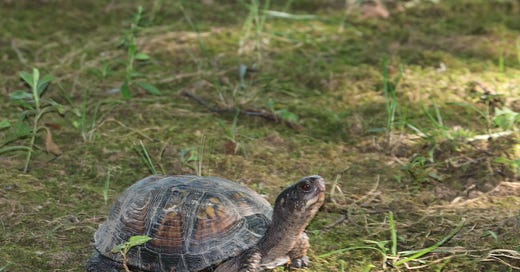An Introduction
Box Turtle at Amnicola Marsh.
I recently wrote a new introduction to the Robert Sparks Walker booklet I am revising. His significance as a Tennessee conservationist compelled me to continue the work. His nature writings are an excellent place to begin an exploration of the natural world in our area.
I am the incarnation here
of father’s farm I loved so dear.
- “My Fathers Farm” Robert Sparks Walker
Introduction
Several years ago, the Tennessee Department of Environment and Conservation honored Walker by naming their lifetime achievement award The Robert Sparks Walker Award. This says more than I can write about his significance as a Tennessee conservationist. That significance came into sharp focus when I learned he was a fellow poet.
Although I read Walker’s writings extensively, this booklet is not a scholarly work. It is a record of what I read and what I learned from his substantial body of work. I have devoted a page or two to each of the works in the order of publication. I also commented on two works about Walker, a biography and a master’s thesis about his early literary works.
Walker began writing freelance articles while still in high school. By then, his family had moved from the log cabin on his father’s farm, but he never lost his connection to the land. He arranged for the property to become a sanctuary of the Chattanooga Audubon Society, which he founded. During his lifetime, the Maclellan Foundation donated Maclellan Island in the Tennessee River, which became the second sanctuary. Since Walker’s demise, two more sanctuaries have been added.
From his roots on the farm, Robert Sparks Walker grew to manhood and married Elberta Clark in 1904. Their elder son, Robert Jr. died in an automobile accident at age 8. Elberta died in 1924, leaving Walker as the sole parent of their remaining son, Wendell then age 14. Walker, Elberta, and Robert, Jr. are buried on that farm, now known as Audubon Acres. More of the story of Walker’s early life appears in Chattanooga’s Robert Sparks Walker: The Unconventional Life of an East Tennessee Naturalist.
Walker acquired fifty percent ownership of the Southern Fruit Grower magazine in 1900. He was the editor and publisher until 1921. He then served as Nature Editor of Flower Grower magazine from 1923 until 1934 and had a column in the Chattanooga Times beginning in 1933.
Walker published his first book, Anchor Poems in 1925 and a second book of poems, My Father’s Farm, in 1927. He had a growing reputation as an author and editor when, at age 53, he published Torchlights to the Cherokees (Macmillan, 1931). A Pulitzer Prize nomination for that work advanced his career and gave more attention to his fiction, nonfiction, and poetry. He also authored numerous articles and nonfiction booklets. He created several scrapbooks. He edited two magazines, appeared on a regular radio show, and made television appearances.
The University of Tennessee at Chattanooga Library holds volumes of his work in the special collections department. The Chattanooga Public Library and the Tennessee State Library and Archives each have an extensive collection. The Library of Congress and several academic libraries nationwide have copies of Walker’s major works.
I searched the Chattanooga Public Library Catalog and the Local History Department stacks. I used the “Ask a Librarian” feature on the Tennessee State Library and Archives website. Librarians at both of these fine organizations were gracious and helpful. I also examined materials at Audubon Acres.
I used the online database worldcat.org to learn about the distribution of Walker’s works. The search yielded lists of libraries housing his works Most of these works are out of print, so those copies are treasures.
The Chattanooga Audubon Society reprinted his book, As the Indians Left It while I served as president. A Torchlights to the Cherokees reprint is available from Overmountain Press in Johnson City. Walker’s granddaughter, Alexandra Walker Clark, arranged a posthumous printing of his book Nature Ghost Stories and wrote a Walker biography.
May Bell Fisher wrote a thesis about Walker’s early works for a Masters degree in literature at Peabody College of Education, Vanderbilt University. I have included comments on this thesis and the Walker biography.
My comments on the publications appear in chronological order of the publication date. I only included comments on two journal articles. More is not practical at this time. I hope that this work will motivate others to examine Walker’s published works and learn more about his founding role in Tennessee conservation.
My new book, It’s Just a Phase, is available from the publisher: https://walnutstreetpublishing.com/products/its-just-a-phase/
Coming Events
Wednesday, February 19, at 6:00, I will host a generative poetry workshop at Reve Coffee and Books, 1948 North Point Boulevard, Chattanooga, Tennessee, 37409.
Saturday, March 22, from noon to 4:00, I will have a signing at The Crazy Book Lady, 5058 Cherokee St., Acworth, GA 310101.
Saturday, March 29, from 10 AM to 4:00 PM, I will participate in the Author Fair at the Dalton - Whitfield County Library, 310 Cappes St., Dalton, GA, 30720.
On April 4-6, I will particpate in events at the Trails and Trilliums Naturalist Roundup at the Beersheba Springs Assembly, ABeersheb Springs Tennessee. Participation is limited to conference registrants. I will be part of an Authors’ Panel and give a poetry reading.
On April 26, I have a signing at the Chattanooga Barnes and Noble from noon until 3:00 PM.





